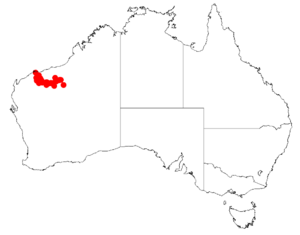Yarnda Nyirra wattle facts for kids
Quick facts for kids Yarnda Nyirra wattle |
|
|---|---|
| Scientific classification |
|
| Kingdom: | Plantae |
| Clade: | Tracheophytes |
| Clade: | Angiosperms |
| Clade: | Eudicots |
| Clade: | Rosids |
| Order: | Fabales |
| Family: | Fabaceae |
| Clade: | Mimosoideae |
| Genus: | Acacia |
| Species: |
A. arrecta
|
| Binomial name | |
| Acacia arrecta Maslin
|
|
 |
|
| Occurrence data from AVH | |
| Script error: The function "autoWithCaption" does not exist. | |
Script error: No such module "Check for conflicting parameters".
The Acacia arrecta, often called Yarnda Nyirra wattle or Fortescue wattle, is a type of shrub. It is part of the large Acacia plant family. This wattle is special because it only grows in dry, desert-like areas in northwestern Australia. This means it is endemic to that region.
What it Looks Like
This wattle is a low, bushy shrub that spreads out. It usually grows to be about 0.4 to 1 meter (1.3 to 3.3 feet) tall. It can spread out to about 2 meters (6.6 feet) wide. It often has many stems coming from the ground.
The bark on its main stems is smooth and grey. Sometimes, it can have small cracks at the very bottom. Its small branches have sticky, raised lines. Like most Acacia plants, it doesn't have true leaves. Instead, it has phyllodes. These are flattened leaf stems that look and act like leaves.
The phyllodes of the Yarnda Nyirra wattle are grey-green and sticky. They are shaped like thin tubes and end in a hard, non-sharp point. Each phyllode is about 15 to 40 millimeters long and about 1 millimeter wide. They have eight faint lines running along them. This wattle blooms for a long time, from January all the way to December, producing bright yellow flowers.
How it Was Named
This plant was first officially described in 1982 by a botanist named Bruce Maslin. He wrote about it in a scientific paper. Later, in 2003, another botanist, Leslie Pedley, gave it a different name, Racosperma arrectum. But in 2006, it was moved back to the Acacia group. So, its official name is still Acacia arrecta.
Where it Grows
The Yarnda Nyirra wattle is found in the Pilbara region of Western Australia. It likes to grow on flat, stony areas and low, rocky hills. It prefers shallow, rocky soils.
You can find this plant from around Millstream Chichester National Park in the west. Its range goes east to places near Nullagine. It also grows as far south as the Hamersley Range, close to Wittenoom. While it is common in the areas where it grows, it is spread out in different spots. It usually grows as part of shrubland areas, especially where spinifex grass is common.
 | Audre Lorde |
 | John Berry Meachum |
 | Ferdinand Lee Barnett |

